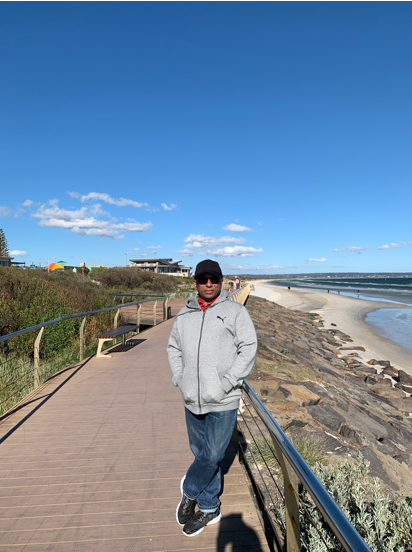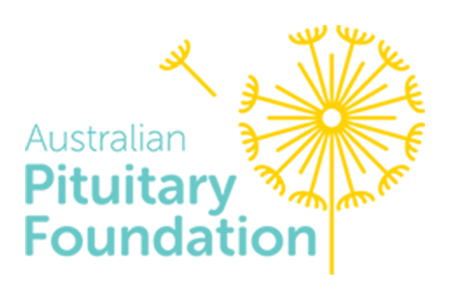A Patient’s Journey
Non-functioning Pituitary Adenoma

I Found out I had a Tumour
It was Monday 4 September 2017. I was at my desk staring intently at my computer but something was not quite right with my sight. I would take off my glasses and put them back on and repeated this a few times. I brushed it off thinking I need to get my eyes checked.
A few days later the same feeling returned so I fixed an appointment with my optometrist.
On 16 September he did a thorough check but couldn’t find anything wrong. Whilst I was relieved, the discomfort persisted. I went back to my optometrist on 9 Oct and though the outcome didn’t change, he recommended that I see my GP. On the 12 Oct I saw my GP and explained what was happening. He asked me to do a CT Scan right away.
After doing the CT Scan, the Radiologist explained that I have a tumour in my Pituitary Gland but hastened to add that most Pituitary Tumours are benign. However he wanted me to do an MRI but I had to wait until the next day as the machine was booked out. The next day happened to be Friday the 13th and I dread MRIs. The MRI confirmed what the CT Scan had shown. My GP urgently referred me to a specialist pituitary neurosurgeon and at 5pm that day, I was in the neurosurgeon’s looking at two very large screens that had my MRI images.
40 days from when I felt a discomfort looking at my computer screen, I found out that I had a tumour.
The course of action
My neurosurgeon explained that I have a large macroadenoma and pointed out where the tumour was located. He said that whilst most Pituitary disorders can be treated without surgery, when there is a large tumour present, often surgery is the best course of action. He explained how the Endoscopic Transnasal Trans-sphenoidal Surgery would be done and described it as a minimally invasive surgery. We discussed the pros and cons of this type of surgery and although I was overcome with fear, anxiety and that feeling at the pit of your stomach, I was armed with knowledge and that empowered me on my decision making process.
In any case, I had to complete a few more tests in the following week:
- Blood tests to check hormone levels – Cortisol, Prolactin, Thyroid, Testosterone, growth hormone
- Visual Field Tests with an Ophthalmologist
- ENT Surgeon to get his assessment
I met with my neurosurgeon after all the test results were sent to him. The results from the blood tests showed normal ranges and importantly the prolactin levels were normal. It confirmed that surgery was indeed the best course of action and furthermore if I didn’t do anything, there was a good chance the tumour would grow and compromise my vision.
Visual Field Tests confirmed my optic nerves were not compromised and my peripheral vision was good. I also saw the ENT surgeon who identified the presence of polyps and a deviated septum, which he said could be treated at the time of surgery .
My neurosurgeon reiterated his initial recommendation that I should consider surgery. As I was driving home reflecting on everything, I realised my palms were sweaty and that I felt raw fear. My throat had gone dry and I was beginning to feel very anxious. I pulled over and called my wife. She initially insisted on taking a cab and driving me back but slowly my nerves felt better and I decided to get back on the road and all through my drive home my wife was on the phone.
I made the decision to have the surgery and went through the process with the neurosurgeon’s office staff who were most helpful. The surgery was scheduled for 9 November and I wanted the day to come fast but had to get through a long four-day holiday, as it was the Melbourne Cup weekend. I felt it was the longest period of my life. I felt time stood still. The anxiety attacks continued.
Although my family, friends and close relatives reassured me that everything would be fine, I couldn’t help feel very alone. I imagined the surgery going badly and dying on the operating table. I have an extremely curious mind so I researched everything I could find and even saw videos of the surgical procedure. I was so filled with information but equally filled with anxiety.
November 8 finally dawned and I arrived at the Hospital.
Surgery and Recovery
Soon after I was escorted to my room at St Vincent’s Private Hospital, it was non-stop activity. More tests, lots of forms to fill, visit by the endocrinologist, etc. Surgery day arrived and I was allowed a light breakfast at 7am. But I had to wait until 5pm before being stretchered to the theatre. My last memory was looking at very large TV screens whilst being readied for surgery.

It wasn’t an easy night after the surgery as I brought up a lot of blood. Turned out the blood that had drained into my stomach during surgery was purged out but not before there was panic amongst the night staff. My neurosurgeon was also woken up and reassured everyone that things were ok. It was a slow recovery with frequent headaches, soreness and feeling of unease. My nose was all taped up and I was told not to exert any pressure otherwise the packing inside my brain would come loose. I also learnt that the spinal fluid had to return to normal to start feeling ok.
My neurosurgeon dropped in the following afternoon and mentioned the tumour was 3 cms in size and much bigger than originally thought and also very firm. But he was confident the entire tumour was removed. The ENT surgeon too was pleased that the polyps were removed. One thing I did not enjoy was the whole fluid management where I was allowed small quantities of water and had to measure how much I peed.
On 14 Nov after spending 6 days in hospital, I was discharged.
Life after surgery
On 12 December 2017, 33 days after surgery, I had my first post op review with my neurosurgeon.
He commented that I was looking well. Aside from some pressure in my head, I was starting to feel normal. The biopsy confirmed the tumour was benign and non-secreting type.
At my 3-month review in Feb 2018, I received the news that the tumour was completely removed and there were no traces present on an MRI scan. I was given the all clear to get behind the wheel and travel by air.

Although I started to look and feel normal, the gland that influences nearly every part of your body was gone! This is where the endocrinologist comes in. I’ve been seeing a specialist pituitary endocrinologist since December 2017 and she has put me on a hormone treatment plan that seems to be working very well. I exercise, work and socialize like before and don’t feel any tiredness or unwell. However, I do experience some mood swings that I hadn’t noticed prior to the surgery and my family and close friends tell me that I have become more sensitive and emotional.
I am forever grateful for the expertise of the specialist pituitary team who looked after me as well as the support through the Australian Pituitary Foundation who continue to do a mountain of work both visible and behind the scenes to support all living with pituitary conditions. I would encourage you to become part of the community for pituitary support in your personal pituitary journey.
